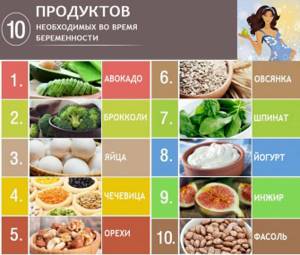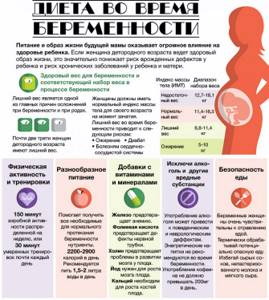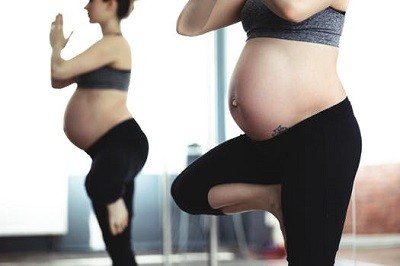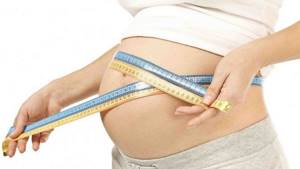Exercise is recommended even during pregnancy.
They help keep muscles toned, have a positive effect on metabolism, blood circulation, and also help keep body weight under control.
It will not be possible to lose weight during pregnancy, since this situation inevitably leads to weight gain, but keeping your body within the recommended limits will even be useful.
Pros and cons
If a woman’s weight before conceiving a child was normal, then the natural rate of increase is up to 15 kilograms up to 9 months. In the case when the indicator is exceeded already in 4-5 months, you should think about losing weight. Extra pounds threaten to complicate childbirth. It is also necessary to adhere to a diet for those who were mildly obese before pregnancy. Arguments for dieting while pregnant:
- improving the chances of giving birth to a healthy child (if the fetus gains more than 4 kilograms due to the mother’s abundant nutrition, this leads to a weakening of contractions);
- reducing the risk of complications during childbirth;
- improved health (a balanced diet allows the body to supply proteins, fats, carbohydrates, as well as essential vitamins and microelements);
- easy weight loss after childbirth.
However, you shouldn’t get carried away with diets in their common understanding. Eating one type of product, so-called mono-diets, is strictly contraindicated. Also, pregnant women should not avoid meat and fish products, since the body of the mother and child receives protein from them.
The norm for optimal weight gain in position
Standard indicators for maximum weight gain for the full period of gestation directly depend on the physique of the expectant mother. The larger the girl, the fewer kilograms it is permissible to gain from the moment of conceiving a child:
- From 10 to 12 kg with an average build.
- Overweight girls should stick to 7 to 8 kg.
- Thin mothers are allowed to gain no more than 15 kg during the period of bearing a baby.
The rate of weight gain also depends on how many embryos are in the girl’s belly (one or several). During a multiple pregnancy, it is permissible to gain 20 kg.
When doctors recommend losing weight during pregnancy: medical indications
Experts have repeatedly stated that pregnancy and childbirth proceed better if a woman’s weight is normal. However, for some indications, it is recommended to lose weight while pregnant. The reasons are related to risks to the health of the fetus and mother. So, medical indications for losing weight are:
- improvement of the birth process;
- risk of hypertension and diabetes.
The incentive to lose weight is the health of the child. A mother who has begun to feed for two eats a lot of sweet, flour and fatty foods, while thinking that such nutrition is beneficial to the fetus, is mistaken. A healthy child can be born only if the diet is balanced and complete, it contains the optimal amount of protein, fats and carbohydrates. The diet during pregnancy is aimed primarily at ensuring that the expectant mother, and with her the child, receive the maximum of nutrients from food, and not empty calories.
How to calculate optimal weight
Typically, in the first half of pregnancy, a girl gains about 40% of her total weight; in the second half of bearing a child, the remaining 60% of her weight falls. The optimal weight during pregnancy is individual for each woman and depends on her physique before conceiving a child. As a rule, the greatest weight gain is observed in fragile, short women. Also, the indicators directly depend on how many babies the girl is carrying.
Singleton pregnancy
Weight gain during a singleton pregnancy occurs unevenly, and each month has its own standard indicators:
- For 2-3 months - no more than 1 kg.
- During the 4th-5th - no more than 2 kg.
- During the 6-7th month - no more than 3 kg.
- During the 8th-9th - no more than 2 kg.
Starting from the second trimester of bearing a baby, the expectant mother gains from 300 to 500 grams per week. If weight gain exceeds these indicators, they review their diet and go on a diet.
For twins
If two embryos develop inside the uterus at once, weight gain occurs much more intensely. 50% is added to the standard indicators for a singleton pregnancy.
As a result, the weight gain will be:
- For 2-3 months - no more than 1.5 kg.
- During the 4th-5th - no more than 3 kg.
- During the 6-7th month - 4.5 kg.
- During the 8th-9th - no more than 3 kg.
When to lose weight during pregnancy
Losing weight for no apparent reason is not safe. Indications for losing weight are described above, but there are also contraindications under which you cannot lose weight:
- problems with the gastrointestinal tract;
- liver and kidney diseases;
- problems with the heart and blood vessels;
- when weight gain corresponds to anatomical indicators.
Strict diets are strictly prohibited, as they do not pose a risk to development. Even if a woman used mono-diets, vegetarian or raw food, the menu needs to be diversified. There is no point in abruptly including foods into your diet that were not previously on the menu. It is better to slowly introduce them into the diet, making their intake normal by the middle of the second trimester.
What are the dangers of uncontrolled weight loss during pregnancy for a child?
Losing weight when not enough nutrients enter the body is dangerous for the health of the fetus. Main risks:
- risk of miscarriage;
- development of diseases in the womb (including diseases of the gastrointestinal tract, kidneys, liver);
- insufficient nutrition of the brain, and, as a consequence, diseases associated with it.
Uncontrolled weight loss will in any case harm the child. During pregnancy, the mother’s body provides nutrition to the fetus, and if the fetus itself does not receive enough nutrients, then so does the child.
How weight loss can affect the placenta and blood supply
The placenta is an organ that forms in a woman during pregnancy. She is responsible for transferring nutrients to the baby. As a result of poor nutrition, placental insufficiency occurs, which is expressed in dysfunction of the organ. The placenta can no longer provide the fetus with the necessary substances, and this can even lead to death. Also, uncontrolled nutrition affects the fact that blood circulation is disrupted, and this causes the development of oxygen deficiency.
How to lose weight safely for women and fetuses

It is important that weight loss occurs safely. Therefore, during pregnancy it is strictly prohibited:
- apply grueling diets, especially mono-diets, which lead to a lack of nutrients in the diet;
- exercise hard, which can cause risks of complications and premature birth;
- use fat burners and other additives that cause surges in pressure, temperature, and so on.
Weight loss should be based on the following principles:
- weight should be reduced gradually;
- the basis is proper nutrition, balanced in all elements;
- training must be adequate. Walking, light bodyweight exercises, yoga, and stretching are allowed.
The workout should be selected depending on the trimester of pregnancy. At each stage a certain type of load is allowed.
When needed for medical reasons: a diet without harm to the child

A diet without harm to the child and mother includes vegetables, fruits, dairy products, and unrefined foods. Vegetable oils, meat and fish are also required. You should not completely exclude sausages, sausages, butter, white bread and other unhealthy foods from your diet, especially if you are used to seeing them on your table every day. But such things need to be included in a minimal amount, since in addition to calories they do not contain harmful, carcinogenic substances.
Essential vitamins for proper metabolism
Vitamins are best absorbed from food, not vitamin complexes. This is explained by the fact that tablets, even of excellent quality, affect the excretory system, forcing it to work at the limit of its capabilities. This will not be beneficial during pregnancy. For the development of the fetus and proper metabolism, vitamins of groups A, B, E, C, Omega-3 group, potassium and calcium are necessary. You can find them in:
- any varieties of sea and river fish;
- green, red, orange and yellow vegetables;
- all types of greens and salad;
- fermented milk products (but they should not be high in fat);
- cereals;
- dried fruits and nuts;
- fruits;
- lean chicken and turkey.
Vegetable oils that are rich in vitamin E will be useful. They help improve metabolism, better functioning of the placenta, and keep a woman’s skin, hair and nails in excellent condition. Vitamin E also helps improve the condition of the skin, after childbirth there will be fewer stretch marks, the skin will be smoother and more even. You can find it in fish oil, flaxseed oil, and nuts.
Amount of water and liquid
It is recommended to drink at least two liters of clean water per day.
But if there is swelling and body weight increases due to fluid retention, you can reduce it by half a liter. Liquid that is included in broths and soups - in unlimited volume. You should be careful with fruit drinks, milkshakes, and juices - in addition to healthy vitamins, they also contain a large amount of sugars, which is not good for the child’s health.
Number of servings per day
The amount of food consumed is purely individual. It cannot be said that a woman whose weight before birth was 45 kilograms and one whose weight reached 100 kg need to choose portions of the same size.
For a woman whose weight fluctuates between 60-70 kg during pregnancy, portions of 200-300 grams are optimal, with at least four meals. Optimal power supply:
- breakfast;
- lunch;
- dinner;
- snack;
- dinner.
The number of servings per day is from four to five. It is not recommended to reduce the frequency, as there is a risk that the child will not receive nutrients on time for his development.
Diet for pregnant women
Nutritionists recommend that women in an “interesting situation” adhere to the following simple but very important rules.
- Eat little but often - at least 5-6 times a day.
- The interval between meals should be at least 3-4 hours; you should never skip lunch, much less breakfast.
- Dinner should be light, but at the same time nutritious, so that you do not feel hungry half the night.
- You should get up from the table with a slight feeling of hunger (our body is designed in such a way that with a normal diet, satiety is usually felt 15-20 minutes after eating).
- Chew long and thoroughly (poorly chewed food is difficult to digest and causes constipation).
- Do not eat fried, smoked, fatty, too salty, pickled, or canned foods.
- Give preference to fruits, vegetables, herbs, fermented milk, protein products (fish, eggs, seafood) - they contain much-needed proteins and vitamins and at the same time are tasty and low in calories.
- Drink at least two liters of pure still water a day (teas, compotes, soups do not count).
- Reduce your intake or gradually give up salt altogether (it retains fluid in the body and disrupts kidney function).
- Limit the consumption of baked goods and sweets, replace them with dried fruits (prunes, dried apricots, raisins, figs) and nuts (pine nuts and walnuts are especially useful for pregnant women).
- Replace coffee and black tea with compotes and juices.
- Half an hour before meals, drink a glass of filtered still water.
- Eat porridge (buckwheat, millet, wheat, barley, corn, oatmeal) every day - they not only contain a lot of vitamins and microelements, but also the fiber necessary for healthy digestion.
- Do not fry meat, fish, vegetables, but stew or boil them.
There are also several rules with which you can “deceive” the feeling of hunger. So, if you are terribly hungry, and lunch is still far away, put a lollipop in your mouth (preferably made from natural ingredients) - the glucose it contains will signal the brain that you are full.
Do not go to the store, visit or eateries (cafes, restaurants) on an empty stomach - before leaving home, have a light snack, for example, diet bread, fruit or crackers.
How to lose weight in your legs while pregnant: exercises and strength training on muscle groups

The legs are subject to serious stress while carrying a child. They bear not only the weight of the developing child and the increased weight of the mother. Hormonal changes occur in the female body, which also affects the limbs. The basis for losing weight in your legs is proper nutrition. Exercises in the pool are perfect - they will tone up not only your legs, but also your back, hips, and chest. Useful exercises for legs and buttocks:
- bicycle (lying on your back, with your legs raised, make movements as if you were riding a bicycle);
- walking in place (feeling the muscles, just walk in place, raising your knees to 30-40 degrees);
- butterfly (spread legs are connected at the feet, then arms are spread to the sides).
Light exercise on a fitball will help (in addition to strengthening the legs, this helps reduce the risk of perineal rupture during childbirth), yoga (strengthens the pelvic ligaments, which increases the speed of childbirth).
During pregnancy, jumping rope, roller skating and skating, fast running, aerobics, and pulling up dumbbells are prohibited.
Sample program for burning fat at home
Fat burning at home will be possible, but the process must be approached with the utmost caution. It is necessary to choose safe exercises for pregnant women to lose weight that do not create unnecessary stress on the abdominal area and do not overload the body.
Attention! You can use different exercises for each muscle group, then combine them into a complex. In this case, it is important to follow the correct technique, and if negative sensations arise, stop performing and consult a specialist.
On the legs and buttocks

Legs and buttocks training is done with your own weight. The use of dumbbells, barbells and other weights is not recommended. It is worth focusing not on the maximum load on the muscles, but on increasing calorie consumption and maintaining the body in tone, as well as accelerating metabolism.
You can add the following movements to the program:
- squats. Simple squats without weight will be the most effective. You need to stand up straight, place your feet approximately shoulder-width apart and slowly lower your body down, then also slowly rise back up;
- lunges. Also used without weight. A step is taken forward, the leg bends at the knee as low as possible, then the body returns to its original position.
The load on your legs can be increased by walking. They will be most useful in any trimester. It is recommended to monitor your pulse so that it does not exceed one and a half hundred beats per minute.
Is it possible to lose weight in the third trimester?
In the last trimester, weight gain occurs due to fetal growth.
Some women even lose weight during this period, as they gradually lose their own extra pounds. During this period, the emphasis is on salads, fruits, greens, light dairy products and whole grain dishes. Three weeks before the expected date of birth, it is advisable to include a minimum of calcium-rich foods, meat and fish. Some restriction of the diet does not threaten problems with the fetus, but it will allow the expectant mother to start losing pounds.
Is it possible to lose weight if you are overweight?
How to avoid gaining excess weight during pregnancy
Only in some cases, as an exception, doctors can strongly recommend that expectant mothers get rid of excess body weight if obesity is harmful to the unborn child. Most often, the gynecologist makes this decision in cases where there is a danger to the baby’s future life. Mothers may also be forced to lose a few pounds in the following situations:
- If the mother's excess body weight causes premature birth of the baby in the last stages of pregnancy;
- When the first seven days of pregnancy are accompanied by the body's attempts to reject the fetus through spontaneous abortion;
- When excess weight can cause severe blood loss during childbirth;
- If there is a risk of postpartum complications in the form of a long and problematic recovery.
Due to the presence of a strong fat layer during pregnancy, doctors cannot reliably determine the condition and development of the child. As a result, the following problems may develop:

Possible excess weight
- the presence of severe varicose veins;
- diseases of the cardiovascular system;
- nervous system disorders;
- disruptions in the functioning of the endocrine system;
- hypertension;
- increased blood clotting activity;
- problems with the urinary system;
- increased load on the spine;
- the threat of spontaneous rejection of the child increases;
- the need for surgical intervention at the birth of a child;
- carrying a child longer than expected;
- premature birth.
Doctor's recommendations
You should lose weight under the supervision of a doctor, and if there are medical indications for it. It is impossible to lose weight if a woman is not psychologically comfortable (feels fat). The doctor's recommendations are:
- Only a specialist can correctly create a diet;
- light workouts will help you cope with excess weight and improve your metabolism;
- You should not get carried away with mono-diets, vegetarianism and raw food diets (in rare cases, it is allowed as a fasting day).
Pregnancy is a complex physiological process. It is not possible to predict how weight loss will affect the child’s body in a particular case. Therefore, you should only engage in weight loss for medical reasons; at the slightest danger, consult a doctor.
Expert advice

Professionals, such as trainers and doctors, recommend that all pregnant women who do not have contraindications devote at least a little time to special fitness. This will improve your health and keep your body in good shape.
Women who are overweight can also expect to lose some weight. This is achieved primarily through proper nutrition and light exercise. Exhaustive activities are not allowed; they can harm both the woman and her unborn child.
Eduard Kanevsky, coach
The trainer deals not only with fitness and bodybuilding, but also with pregnant women. Eduard Kanevsky believes that pregnant women should not exhaust their body with heavy training, but keeping it in good shape is fundamentally important. If you are overweight, then you should try to reduce it, but without fanaticism, difficult exercises and fasting.
Alexey Kovalkov, nutritionist
Doctor of Science and well-known nutritionist in the country Alexey Kovalkov believes that it is possible to lose weight during pregnancy, but first of all through proper, healthy nutrition and light exercise that does not have negative consequences on the body.
Alexander Myasnikov, doctor
A well-known doctor in Russia believes that losing weight during pregnancy is possible, and in some cases even useful. If you are overweight, you need to adjust your diet correctly and start doing simple exercises that will speed up your metabolism and help reduce swelling somewhat.
What are the dangers of being overweight during pregnancy and how to eat properly?
Some statistics
Russian scientists analyzed the course of pregnancy and childbirth in 200 women with obesity caused by poor diet. It turned out that
- 48% had concomitant diseases of internal organs (most often diseases of the cardiovascular system and gastrointestinal tract),
- 68% were diagnosed with gynecological diseases.
Moreover, the main complications during pregnancy in such women were gestosis (a condition manifested by high blood pressure, edema and kidney damage with the appearance of protein in the urine), anemia, threat of miscarriage, and an increase in the frequency of births of children with congenital defects.
Also, excess weight during pregnancy can contribute to the development of diabetes (so-called gestational diabetes). In addition, in obese women, the fetus is usually born large, that is, more than 4000 g, which adversely affects the course of labor. Weakness of labor often develops, a discrepancy between the sizes of the mother’s pelvis and the fetal head is discovered, injuries to the birth canal and injuries to the fetus occur.
Why does excess weight accumulate during pregnancy?
During pregnancy, all the prerequisites are created for the natural accumulation of body fat in the area of the mammary glands, buttocks, thighs and abdomen. The leading reasons for this are: a decrease in physical activity and energy consumption, an increase in appetite and especially changes in the hormonal levels of the body. As a result of this restructuring, the production of hormones in the body that increase fat deposition is activated: progesterone, human chorionic gonadotropin, prolactin, placental lactogen. In addition, in pregnant women, the gastric mucosa begins to intensively produce the hormone ghrelin, which stimulates appetite and “forces” you to eat more.
Within reasonable limits, the accumulation of fat is quite justified, since the woman’s body creates conditions to protect the fertilized egg. But when there is an excessive process of fat deposition, it can harm both mother and baby. Therefore, it is necessary to adhere to a diet for pregnant women.
Use our “Weight Calculator” service

How to deal with excess weight during pregnancy? 9 important rules:
Counting calories
If there is excess weight during pregnancy, expectant mothers need a special diet for pregnant women, within which they will have to strictly control the calorie content of their menu, while sharply limiting easily digestible carbohydrates against the background of a moderate fat content and a sufficient amount of protein. The energy value of the diet should be 2000–2200 kcal and include 120–130 g of proteins, 200 g of carbohydrates and 70–80 g of fats (of which 35–40 g are vegetable).
We eat fractionally
To suppress the feeling of hunger, pregnant women should eat frequently (at least 6 times a day), the food should be voluminous, but low in calories. For example, a bowel-cleansing salad called “Broom” (fresh white cabbage, pumpkin, zucchini, carrots) is recommended as an appetizer; for starters, pearl barley soup with vegetables; for dessert, fructose-based apple jelly.
Cooking correctly
For pregnant women, boiled, stewed, baked dishes are preferred. But fried, pureed and finely chopped products are undesirable. The fact is that pureed and finely chopped dishes have a gentle effect on the gastrointestinal tract, are easily digestible and do not stimulate intestinal motility, which means that the absorption of all nutrients occurs in full and with minimal energy expenditure for digestion, which is the case with excess body weight no use at all.
Eliminate appetite stimulants
It is necessary to exclude from your diet dishes that increase the excitability of the food center and increase appetite (spicy, salty dishes, strong broths, seasonings and spices).
No to hunger!
Under no circumstances should you go hungry during pregnancy, even if you are overweight, as this will lead to the formation of acetone bodies in the blood (ketonemia), which can adversely affect the development of the baby. But holding fasting days once a week is even recommended.
Choosing healthy carbohydrates
Everyone knows that if you are prone to excess body weight, you first need to limit sweets (the so-called simple, easily digestible carbohydrates). In this regard, sugar, honey, jam, sweets and confectionery are excluded from the menu. If it is difficult to do without sweets, then instead you can use a natural sugar substitute - fructose (fruit sugar found in fruits).
The combination of simple carbohydrates and fats in the same product (or meal) is especially undesirable. Cakes and ice cream make you gain weight not because they contain sugar, but because they combine sugar with fat. This is explained by the fact that simple carbohydrates stimulate the production of insulin, which promotes the deposition of fats that come with them in the body.

When choosing carbohydrates, it is important to consider the glycemic index of the product. This indicator allows you to see how much your blood sugar levels rise after eating. Preference should be given to foods with a low glycemic index (lettuce, cucumbers, tomatoes, cabbage, fresh unsweetened fruits, buckwheat and pearl barley porridge, etc.). And limit (or exclude) foods with a high glycemic index - potatoes, carrots, beets, bananas, grapes, persimmons, white bread, semolina and rice porridge.
Enriching your diet with fiber
Indigestible dietary fiber or fiber (cellulose, pectin) is of particular importance in the nutrition of overweight pregnant women. What are their beneficial effects? Firstly, fiber increases intestinal motility, which leads to a decrease in the absorption of nutrients (especially simple sugars). Secondly, by creating volume in the stomach, these substances suppress the feeling of hunger, since the stomach filled with fiber immediately sends a signal to the hunger center that it no longer needs food.
In addition to fruits and vegetables, wheat, rye and soy bran can be a source of dietary fiber. The latter are especially effective at stimulating intestinal motility. The daily dose of bran is selected individually, focusing on the frequency of stool (preferably 2 times a day). Start with 1 teaspoon 3 times a day, if necessary, increase to 1 tablespoon 3 times a day, adding bran to various dishes or consuming it steamed and washed down with drinks. It should be noted that bran is contraindicated in case of exacerbation of gastritis, peptic ulcer, colitis, etc. In addition, in large dosages, bran can cause increased gas formation.
Stop eating at night
It’s not for nothing that our mothers believed that “fat develops” in your sleep. This statement has a scientific basis. The extraction of fat from adipose tissue is enhanced by the action of adrenaline, and it is actively released only during the daytime and is almost not produced at night. Thus, food eaten during the day is converted into fat to a very small extent and stored in adipose tissue. But the main deposition of fat in the depot occurs at night. Therefore, nutritionists recommend limiting evening meals: dinner should be no later than 2–2.5 hours before bedtime, and without fatty foods.

Food must be well chewed
There is no need to rush and gobble up food on the run. After all, to prevent overeating, chewing food thoroughly is of great importance, which means you need to eat slowly. At the same time, the nutrients absorbed in the duodenum have time to “send a signal” to the saturation center, and the woman stops eating in time. Conversely, “hasty eating” leads to the fact that the signal of satiety is perceived too late, when the stomach is full of excess food.
Making a menu for pregnant women
∗ As a snack, you can offer a pregnant woman raw vegetable salads, vinaigrettes, vegetable salads with boiled meat and fish.
Exclude: pickled vegetables, salted fish.
∗ For first courses, lean vegetable soups, cabbage soup, borscht, okroshka, and beetroot soup can be recommended. Up to 2-3 times a week, soups in weak low-fat meat or fish broth with vegetables and meatballs are allowed.
Exclude: soups with potatoes, rice and pasta.
∗ For the main course, lean types of meat (veal, rabbit, chicken, turkey) and fish (hake, cod, pollock) are preferred in combination with a side dish of vegetables and some cereals (pearl barley, buckwheat). You can cook steam cutlets, quenelles, meatballs, zrazy. After boiling, meat and fish can be baked or fried in pieces.
Exclude: fatty meats, fish, goose, duck, ham, sausages, sausages, canned food, salted and smoked fish, caviar.
Recommended side dishes include all types of cabbage, zucchini, pumpkin, eggplant, cucumbers, herbs, tomatoes, and turnips.
Limit: dishes made from potatoes, beets, carrots.
Exclude: rice, semolina, pasta, legumes.
∗ An expectant mother with excess body weight should choose milk and dairy products with reduced fat content (milk up to 2.5%, cottage cheese up to 9% fat, cheese with a fat content of no more than 15–20%).
Exclude: salty and fatty cheese and cottage cheese, including feta cheese, heavy cream and fat sour cream, sweet cheeses, sweet yogurt, fermented baked milk, baked milk.
∗ As a dessert, a pregnant woman can eat sweet and sour fruits and raw berries, dried fruits, sugar-free compotes, jellies, sambuca and fructose mousses.
Exclude: grapes, raisins, bananas, figs, dates, very sweet varieties of other fruits, sugar, confectionery, jam, honey, ice cream, jelly.
∗ The amount of bread consumed must be strictly limited to 100 g per day, giving preference to rye and bran.
Exclude: products made from premium and 1st grade wheat flour, butter and puff pastry.
Which drinks should you prefer?
Of all the drinks that are indicated for excess body weight, green tea has proven itself to be the most effective. The fact is that it contains catechins, which activate the breakdown of fat, and caffeine, which promotes energy consumption. In general, drinking green tea increases energy expenditure by 80 kcal/day. However, due to the presence of caffeine in it, it is necessary to drink it in reasonable quantities - no more than 2-3 cups per day. In this case, you need to steep green tea for no more than 5–6 minutes: the longer you brew the tea, the more caffeine will have time to release into the drink.
In addition, to suppress the feeling of hunger, it is recommended to drink water, fruit juice and compote without sugar often and in small sips (up to 1 liter per day). This is explained by the fact that the centers of thirst and hunger are nearby, and when thirst is satisfied, the feeling of hunger is simultaneously suppressed.
Sample menu for pregnant women to lose weight

1st breakfast:
vegetable salad with vegetable oil;
low-fat cottage cheese;
tea.
2nd breakfast:
fresh or baked apples.
Dinner:
vegetarian borscht (1/2 serving);
boiled meat;
cabbage stewed with vegetable oil;
dried fruit compote without sugar.
Afternoon snack:
low-fat cottage cheese with milk.
Dinner:
boiled fish;
vegetable stew;
tea.
For the night:
low-fat kefir.
Use our “Weight Calculator” service
Causes of excess weight and its consequences
Unlike diseases, the causes of which are sometimes difficult to explain, the appearance of excess weight in pregnant women is influenced by completely objective factors.
The main problem of pregnant girls is the constant desire to eat something. It would be nice to eat fruits or vegetables, but no, pregnant women are drawn to baked goods and sweets. Girls quickly spoil their figure by including fried and smoked foods on the menu.
Attention! The reason for excessive obesity in pregnant women is often a sedentary lifestyle.
It's hard to stay slim when you're too lazy to move. A pregnancy that proceeds without complications does not imply compliance with “bed” rest.
Uncontrolled weight gain can also be explained by hormonal imbalance. In this case, it is difficult for a woman to deal with the problem on her own. Only a qualified doctor can help a pregnant woman.
If the readings on the scales exceed the required standards, it’s time to correct the situation. Otherwise, the consequences of overeating may affect the unborn child:
- There is a delay in intrauterine development of the fetus. In newborns, heart and abdominal wall defects and neural tube defects are diagnosed.
- The child experiences oxygen starvation and lack of nutrients.
- Children have an increased risk of diabetes and obesity;
- The birth of a large baby is accompanied by complications during childbirth.
- The likelihood of early miscarriage increases.
Excess weight also affects the mother’s well-being. Varicose veins, hypertension, diseases of bones and joints, headaches are frequent companions of obese women. It is much more difficult for them to give birth on their own. Sometimes a caesarean section is the only way to give birth to a healthy baby. Rehabilitation after childbirth will not be easy for a woman either.

Guys! We launched an author community on the topic of health, fitness and longevity. Let's build an ecosystem together that will make us develop, no matter what! Join if you care about your health!










